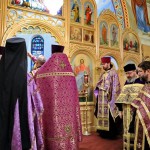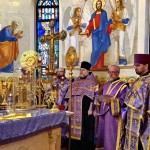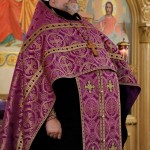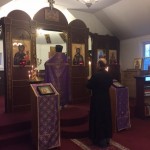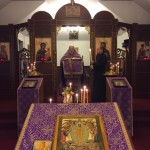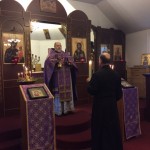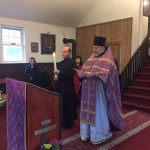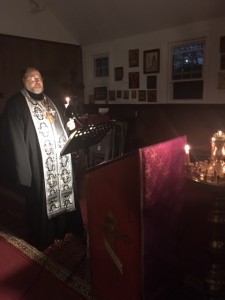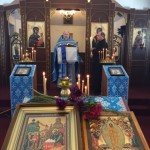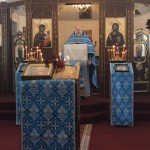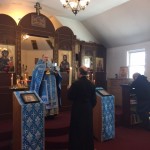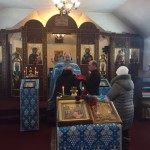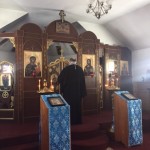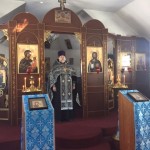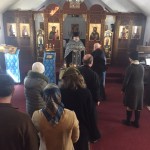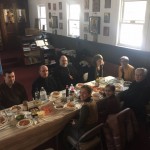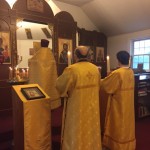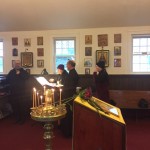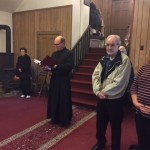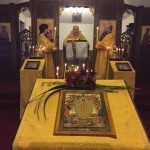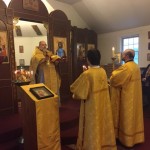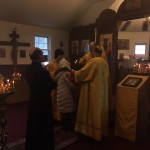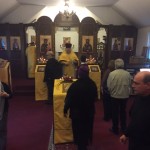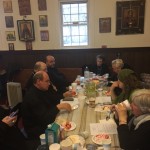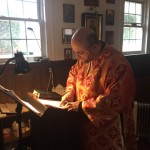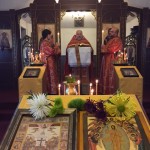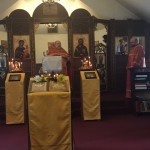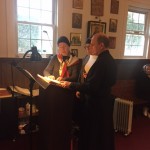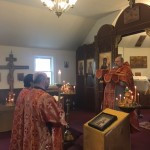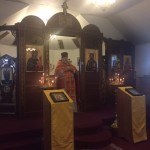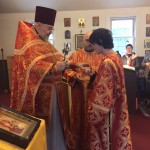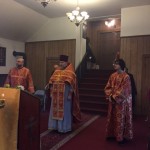On February 11, on the Meatfare Sunday, we had a nice liturgical service at St. George Church. Our Rector, Archpriest Igor Tarasov headed the Divine Liturgy. Following the Gospel lesson he preached the following homily in English:
“Dear brothers and sisters! Today is Meatfare Sunday, and I will begin this homily by quoting one of the great Church writers, St. Demetrius of Rostov. He wrote:
““Recently we were celebrating the Nativity, the first coming of Christ into this world. Today we commemorate His second coming. Not long ago we were glorifying the Christ born, and now we are hearing about the same Christ who is going to come in His glory. Not long ago we were rejoicing about His first coming, and today we are trembling imagining His second appearance. The One who came the first time and the One who will come again is the same Jesus Christ, but those two comings are different.””
““At the first time He came as a meek and mild Lamb, at the second time He will come as a fearsome and vengeful lion. At the first time He came to take away the sins of the world and to grant forgiveness; at the second time He will come to judge the sins of the whole world and to reward everyone according to his deeds. At the first time He was expected and foreseen by the Prophets but He came in silence. For the second time He will come unexpectedly, but with a great noise and commotion. Then the earth will be shaken, the mountains will tremble, the dead will rise from the graves, all the works of human hands will burn, the skies will change. At the first coming, the eyes of man saw Him as a Baby who was swaddled, lying in a manger, held by His Mother’s hands and nourished by the breasts; in the second coming, we will see Him no longer an Infant, but a Man sitting on the throne with many glories, angry at lawless ones, shaking heaven and earth and ruining the whole universe. Oh, how terrible will be the second coming of the Lord!””
“These were the impressive and beautiful words of St. Demetrius of Rostov, a Church Father who lived more than 3 hundred years ago. If we read his homily on Meatfare Sunday, you may see that nothing had changed over those 3 hundred years. We are still waiting for the second coming of Christ and the human nature is still corrupted by sin, so we expect to be judged. But if we examine the Gospel lesson that we heard today, we may conclude that the Last Judgment of the Lord will be based on one important thing – on our works of mercy. Our good or bad deeds will be evaluated, but the Lord will be looking for the works of love, the works of mercy to bless us. And only if He finds none or not much of them, we will be condemned.”
“This is the way the Church prepares us for the special and saving time of Lent. On the Sunday of the Publican and Pharisee we were taught to appreciate a humble prayer. On the Sunday of the Prodigal Son the Church instructed us to repent and convert. And today, on Meatfare Sunday we are reminded that our good deeds, our works of mercy are the most important criteria of our defense before the dreadful judgment seat of Christ. “I desire mercy, not sacrifice”, says the Lord (Mt. 9, 13). That means that all our prayers, our conversions may be in vain if we do not practice mercy towards others. That means that all our services, long vigils, our fasts, feasts and keeping all the customs may become useless if we don’t love and don’t show mercy. Those holy traditions are important to make us ready to do those important works of mercy. But if we fail to feed the hungry, to give drink to a thirsty, to take in the stranger, to clothe the naked, to visit a sick or a prisoner, we may not justify ourselves by our prayers, fastings and Church services. St. Paul says, “Though I speak with the tongues of men and of angels, but have not love, I have become sounding brass or a clanging cymbal. And though I have the gift of prophecy, and understand all mysteries and all knowledge, and though I have all faith, so that I could remove mountains, but have not love, I am nothing” (1 Cor. 13, 1-2).”
“Thus, the Last Judgment will be dreadful for those who sin, for those who lack love and compassion and for those who fail to do good. Therefore, dear brothers and sisters, let us hurry to do good deeds, to practice the works of mercy. Otherwise, at the end of the world we may resemble those sinners who, according to the words of the Gospel, will say to the mountains, “Fall on us!” and to the hills, “Cover us!” (Lk. 23, 30). We would prefer not to live through the Last Judgment but, on the contrary, everybody will be alive, for the dead will rise and the living will change to stand at the judgment. Let us prepare by love and by the works of mercy to stand at the right hand of our Lord and Savior and to reign with Him in His eternal glory!”
Since there was no services for the departed performed on Meatfare Memorial Saturday, the Rector added the Litany for the deceased to the Liturgy with commemoration of those who had fallen asleep.
The choir prayerfully performed penitential hymns from the Lenten Triodion during preparation for Holy Communion.
Following the dismissal of the Liturgy the Rector preached a brief sermon in Russian stressing the main thoughts of his English homily. He also made some announcements regarding the schedule and Church rules of the coming week.
After the liturgical service Rector and parishioners held Annual Parish Meeting.

